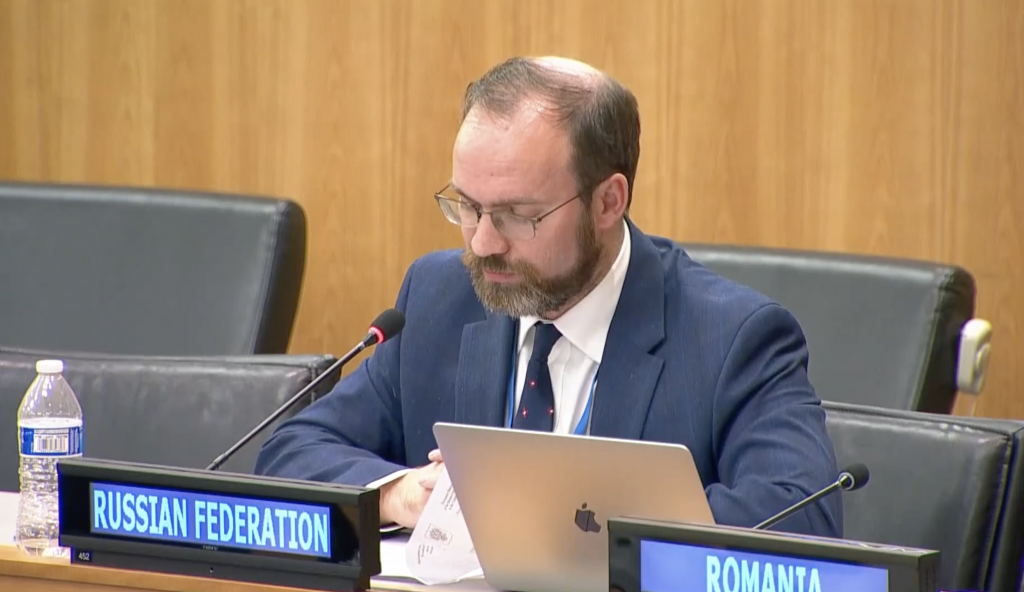Statement by representative of the Russian Federation Mr.Boris Meshchanov during the Second Committee consideration of agenda items 16 "Macroeconomic policy questions" and 17 "Follow-up and implementation of the outcomes of the International Conferences on Financing for Development" of the 77th session of UNGA
Mr. Chairman,
The Russian Federation joins the joint statement on behalf of the countries members of the Group of Friends for the Defense of the UN Charter. We are pleased to participate in today's discussion. Unfortunately, not all countries take an active part in it.
We consider it important to build up joint efforts to achieve the SDGs. Russia allocates $1 billion annually as official development assistance. It is now necessary to focus on the state of affairs in international trade and financing. According to experts, the cost of living crisis is caused by a combination of factors - disruptions in supply chains, miscalculations in monetary policy, unilateral sanctions leading to fragmentation of the economic systems. Actions to strengthen the dollar can increase the cost of importing vital goods to poor countries, capital flight from growing markets, an increase in the debt burden, and a drop in investment in the SDGs.
We are concerned about the deepening of the debt crisis. To overcome it, an important role should be played by multilateral and regional development banks, which must be capitalized through the joint efforts of major donors. This would have a positive effect on lowering the cost of borrowing for developing countries. In the current environment, financing programs cannot be linked to political conditions, including those related to urgent reforms or economic restructuring. It is important to help debtor countries create a "safety cushion". Russia is ready to participate in the discussion of possible emergency initiatives as a member of the G20, the Paris Club, and calls on partners to show responsibility.
In the long term, it is necessary to change the existing proportions in quotas and instruments of international financial institutions in favor of developing countries, to move away from the actual veto right of a narrow circle of countries. It is necessary to continue the dialogue on reforming the international credit rating system. The proposals of DESA and the High Level Panel on the Development of a Multidimensional Vulnerability Index for the benefit of all categories of developing countries deserve further discussion.
Mr. Chairman,
Post-pandemic recovery and sustainable development require a stable trading environment based on the norms and rules of the World Trade Organization and taking into account the needs and requirements of developing countries. As was already noted today, it is absolutely necessary to remove all barriers, which are introduced for political purposes or in order to provide competitive advantages. The stabilization of world markets and prices should be the starting point for the analysis and development of recommendations by the UN Global Crisis Response Group.
It is also important to heed UNCTAD's recommendations on trade facilitation for developing countries as agreed in the recent Bridgetown Pact.
We note the importance of regional agreements. Regional economic integration can play an important role in ensuring the resilience of economies, especially in times of crisis. Thus, from January to July 2022, the countries of the Eurasian Economic Union significantly increased the volume of mutual trade, as a result of the reorientation of export-import flows due to the existing trade and economic restrictions.
There is an acute problem of increasing investment in the countries of the Global South. Unfortunately, the share of investment flows to weak and vulnerable economies remains extremely low. The situation could be reversed by the assistance of donors and the multilateral development assistance system in creating favorable and transparent conditions for investors, as well as the deployment of an insurance and guarantee system, and on the other hand, assistance to developing countries in the preparation of bankable projects.
The return of criminal assets remains among the most effective measures aimed at overcoming global inequality. We support the recommendations of the Secretary General's report on strengthening the international regulatory framework in the field of asset recovery, improving the effectiveness of mutual legal assistance, and discussing the creation of an international asset recovery mechanism under the auspices of the UN. It is necessary to take into account the outcome of the ECOSOC Special Meeting on International Cooperation in Tax Matters and increase the inclusiveness and fairness of tax reform, including through raising the profile of the UN Committee on International Cooperation in Tax Matters and internationalizing the provisions of the UN Model Double Taxation Convention.
The Second Committee of the UN General Assembly should professionally and in a non-politicized way fix all these problems and propose ways to solve them on the basis of the Addis Ababa Action Agenda. We remind of the proposal put forward by the Russian Federation and approved by the ECOSOC member countries to consider in the GA the issue of holding the Fourth International Conference on Financing for Development.
Thank you.
